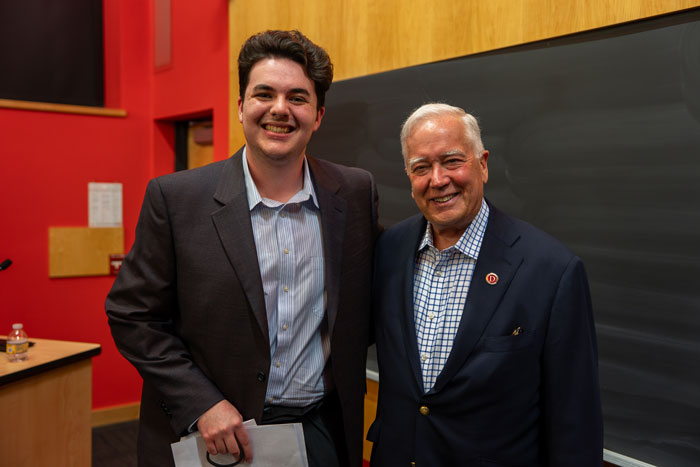Jack Scantland ’28 Wins Dickinson’s Public Speaking Contest

Jack Scantland '28, who went on to win the competition, finishes his speech to applause. Photo by Joe O'Neill.
First-year student takes top prize with powerful reflection on linguistic diversity
by Tony Moore
Jack Scantland ’28 (Spanish & Portuguese studies, international studies) took first place in this year’s Public Speaking Contest, delivering a thoughtful and personal speech centered on linguistic diversity and securing the $400 top prize. Sponsored by the Burgess Institute for the Global Economy, the contest asked students to respond to the prompt “This idea changed the way I see the world,” which inspired Scantland to share how his background and academic interests have shaped his evolving view of language, identity and education.
“I was immediately drawn to the topic of linguistic diversity, specifically the idea of using code-meshing as a tutoring tactic in the writing center,” said Scantland, who is currently enrolled in the Writing Program course that trains future English writing tutors.
A native of Louisville, Kentucky, Scantland spoke candidly in his speech about how his regional dialect has shaped his experience at Dickinson and was “met with initial shock.”
“Ultimately, I felt that I could effectively use my personal experiences as a lens to explain how code-meshing, which is the use of multiple languages and dialects in writing, can preserve a writer’s authentic voice, personality and lived experiences,” he said. “Oftentimes, students are told to write in Standard Academic English, and I thought it was important to talk about how that can harm linguistic diversity, which is so often seen as a hindrance rather than a strength.”

President John E. Jones '77, P'11, congratulates the winner. Photo by Joe O'Neill.
Although Scantland had never participated in a speech or debate competition before, his performance obviously caught the eye of the judges.
“I was so impressed by the combination of solid writing and eloquent delivery in Jack’s speech,” said Amy McKiernan, associate professor of philosophy and director of Dickinson’s Ethics Across Campus & the Curriculum initiative. “His skills as a storyteller and his ability to authentically connect with the audience while explaining why the topic of his speech mattered stood out. Overall, the finalists did a wonderful job, and I’m thrilled to see this competition revived on campus.”
The pool of finalists also included Samantha Ritschel '26 (classical studies), Max Abah '27 (data analytics), Tiara McKinney '25 (Spanish & Portuguese studies, psychology), Michael Wymer '25 (history, French and Francophone studies), Claire Raesly '27 (environmental science, data analytics) and Ayesha Siddiqui '27 (psychology). The competition was tough, but Scantland found it to be invigorating and rewarding.
“The experience was nerve-racking but fantastic,” he said. “One of the reasons I entered was because I wanted to try something new, and doing that is almost always scary. However, the environment was so supportive, and it was amazing to meet new people and hear their perspectives on what they have learned while at Dickinson.”
As for his own Dickinson experience, Scantland said the contest exemplified Dickinson’s liberal-arts approach to education.
“You’re able to write and perform a speech you’re passionate about, developing your professional skills while also getting to hear perspectives you may not have heard otherwise,” he says. “I got the chance to hear from students passionate about classical studies, psychology and environmental science. We all had the same prompt, but our different and diverse experiences at Dickinson led us to unique conclusions.”
Watch the finalists from this year's competition
Launched in the fall of 2024, the Burgess Institute for the Global Economy provides practical learning experiences, mentorships, industry experiences and networking opportunities to prepare students for successful futures in business and finance—no matter what major they're pursuing.
TAKE THE NEXT STEPS
Published April 15, 2025